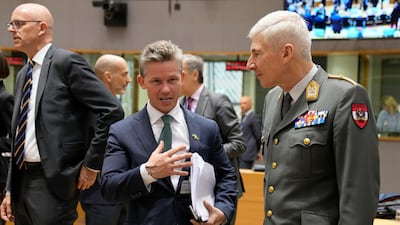Sweden's Defence Minister has said he remains confident of the country's full accession to the Nato alliance as soon as this summer, despite the failure of Turkey and Hungary to ratify the bid.
Speaking at the London Defence Conference, Pal Jonson said the Swedish domestic consensus behind Nato membership was strong, even after Finland entered the alliance ahead of its neighbour. Now all eyes are on the forthcoming Nato summit in the capital of Lithuania in mid-July.
"What I can say is that I feel a growing momentum and growing sense of urgency that we should join the alliance and we are hopeful that we can do it by Vilnius," he said.
"This is a sovereign decision of Turkey and a sovereign decision of the parliament of the Hungarians."
He said a memorandum of understanding with Turkey signed at a previous summit in Madrid had been implemented on the Swedish side. Turkey is braced for a second round of its presidential election on Sunday and diplomats from Nato countries are quietly hopeful of a shift in Ankara once the campaign trail dust has settled.
Mr Jonson said: "We have implemented that [MOU]. We have changed our terrorist legislation. We have joined Nato's fund against international terrorism and we have a dialogue on terrorism.
"We need the kind of security that Nato produces and represents. For me it is only natural for us to have a seat at the table and join the alliance."
The Swedish and Finnish decision to move away from neutrality was triggered by the Russian invasion of Ukraine and the preceding attempt by the Kremlin to demand a treaty of security guarantees with the West. The Swedish tradition of neutrality was previously deep-rooted.
"The concept of military non-alignment was very much ingrained into the Swedish identity," Mr Jonson said. "I think during the Cold War it was to a certain degree perceived as a position of moral high ground."
Mr Jonson said the accession of Sweden to Nato would deliver new access and strategic advantages to the alliance, particularly in the Baltic Sea and in areas such as air defence. "By Sweden now joining, we are consolidating Nato at a military level and also on a political level," he said. "It makes the northern dimension of Nato more secure and more stable."
The minister noted that accession was the "mother of all unintended consequences" for the Kremlin but while the Russian army is currently absorbed with Ukraine, other sections of its armed forces remain largely intact.
"Russia's ground forces are now tied up in Ukraine," Mr Jonson said. "As Minister of Defence I see that their ground forces are both severely weakened and tied up in Ukraine but when I look at their naval assets and when I look at their aerial assets they are almost intact in our area.
"My long-term reading of Russia is that it is going to reconstitute itself and is going to adapt its force posture to the fact that Sweden and Finland are going to be fully fledged members of the alliance."


